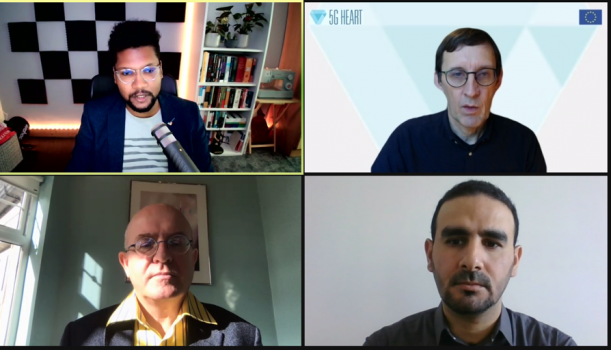 A virtual event was held on 22 October 2021 to discuss ‘Tele-Health Solutions Powered by 5G’ and hosted by two EU supported projects 5GHeart and 5GTours. The event was a huge success with a turnout of almost 100 attendees from all over Europe.
A virtual event was held on 22 October 2021 to discuss ‘Tele-Health Solutions Powered by 5G’ and hosted by two EU supported projects 5GHeart and 5GTours. The event was a huge success with a turnout of almost 100 attendees from all over Europe.
The workshop was divided into three parts, the first of which was a series of presentations on ‘Tele-health applications addressed by the 5GPPP’. The presentations were given by Cyril Krykwinski from the European Commission, Adrien Bresson from the French Ministry of Economy and Finance, and Sofiane Imadali, Orange from the 5GTours project and Per Hjalmar Lehne, Telenor, from the 5GHeart project. The second part was a panel discussion on Tele-Health solutions for Ambulance Care and the third part was a panel discussion on Business Models for 5G Tele-Health.
5G brings the benefits of low latency, higher speed, better coverage, and reliability which lead to higher quality provisioning. This allows many applications such as video, robotics, remote monitoring of health and medication. It brings enhanced mobile broadband, massive machine-type communications, and the current wave of EU-supported projects is based on trials with a focus on vertical applications.
Cyril Krykwinski talked about technology changing the healthcare paradigm and becoming more personalised due to data monitoring and predictive analysis which enables in turn preventative care. The EU Horizon programme will continue to drive investments in 6G to maintain European competitiveness.
We learned from Adrien Bresson that the French government’s 5G national strategy aims to support 5G/6G technological and industrial ecosystems by accelerating demand, supply, R&D, and training in future telecoms, creating 20,000 jobs by 2025 in this area.
Sofiane Imadali talked about the 5GTours connected and remote healthcare use cases which are enhanced by 5G – focused on 3 different cities in Europe – improving logistics in Athens airport, innovative museum visits in Turin, and enhancing healthcare for patients in the city of Rennes. The 4 healthcare use cases leverage 5G features of slicing, ultra-low latency and high reliability, and massive machine-type communications in healthcare applications. The ‘Safe City’ pilot in Rennes is focused on remote monitoring in time-critical, emergency situations using machine-type communications devices, and linked ambulance routing in order to guide a tourist to the hospital. This culminates in the ‘wireless operating room’ which has all the data and imagery of the tourist and the associated emergency all with the help of 5G networks.
Per Lehne spoke about the ongoing pilots in the 5GHeart project which focuses on health, transport, and aquaculture. The healthcare applications consist of remote support using wearable video for paramedics, augmented reality and ultrasound, critical health events, vital sign patches with geo-location facility. These pilots are based in Norway, Finland, Netherlands, France and Greece across several 5G testbeds with learnings on video and network quality and the network bottlenecks which 5G would relieve.
There were a number of recurring themes in the panel discussion on Tele-Health solutions for Ambulance Care hosted by Mohammed Hamza, CUH. Quality of healthcare remains of utmost importance in emergency care for patients while onboarding new network technologies and the new applications these enable. Emergency services, conveyance, and pre-hospital services form the first stage of tele-health and it will continue to grow from here. Stakeholder engagement is also of top priority by encouraging the widespread adoption of new technologies. A personalised approach tailored to the needs of stakeholders such as the government, hospitals, ambulance service, and patients is needed.
The panel discussion on Business Models for 5G Tele-Health, hosted by Donal Morris, RedZinc focused on 5G readiness, connectivity, and applications. 5G readiness is continuing to improve with connectivity becoming more widespread and applications becoming more available as the networks mature. Operators need to invest in infrastructure and hospitals and other stakeholders in equipment and new innovations, supported by the government. It is important to keep patient data secure by ensuring data protection as well as making investments in infrastructure. Hospitals wish to have local governance on data storage infrastructure rather than utilise global resources. In the end, investment in business and technology relationships will help bring about tele-health.
Listen to the recording here https://www.youtube.com/watch?v=pCIL8Ng8kdg
You can read more about the EU projects 5GTours https://5gtours.eu, https://5gtours.eu/category/blog, and 5G Heart https://5gheart.org
Download materials:


